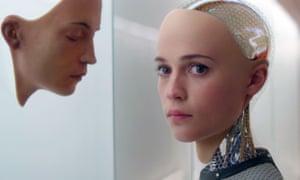 Can you imagine that in the next 15 years all cars would be driverless? Or that all our white good at home would talk to each other and eliminate the need for any human house helps? Maybe at some stage, they would even fix themselves. With Internet of things (IOT) not improbable. Expanding this thought, mail, milk, pizza and shop purchases would be delivered to us by drones, no deliverymen of any kind required. Streets would be monitored by intelligent cameras and streets patrolled by robocop. Why just houses, factories and offices too would have no need for any human workforce. Homes would be 3-D printed, as would car and machine parts... maybe even human body parts printed at home. Science has left nothing in the realm of "impossible" in the age of the fourth industrial revolution (4IR). Even carnal gratification with robotic sex.
Can you imagine that in the next 15 years all cars would be driverless? Or that all our white good at home would talk to each other and eliminate the need for any human house helps? Maybe at some stage, they would even fix themselves. With Internet of things (IOT) not improbable. Expanding this thought, mail, milk, pizza and shop purchases would be delivered to us by drones, no deliverymen of any kind required. Streets would be monitored by intelligent cameras and streets patrolled by robocop. Why just houses, factories and offices too would have no need for any human workforce. Homes would be 3-D printed, as would car and machine parts... maybe even human body parts printed at home. Science has left nothing in the realm of "impossible" in the age of the fourth industrial revolution (4IR). Even carnal gratification with robotic sex. All of the above may or may not happen by 2020, but by 2030, it will surely be a reality. That is if the human race does not end itself and "Mama Earth" before then. The 4IR took centre stage at the World Economic Forum (WEF) this year as developments in this period have very radical implications for humans, and rightly so. Cheap labour is no longer required to be competitive. Disruption in manufacturing techniques, supply-chain logistics, material extraction and handling, back office and administration processes, retailing and distribution, communication is changing the way we work and live. The efficiency, in fact, is a result of doing away with human intervention.
The question on everyone's mind is that if automation will take away 90% of the jobs as we know them now, what is human population going to do? The Utopian thought that Man will use his "unemployment" gainfully to do all the things that were otherwise impossible with a regular job is a weed induced dream. Man's mind without gainful occupation would be the true equivalent of the Devil's workshop and function that way. There is general agreement that unemployment and rising income disparity are the primary reasons for the rise in the world's crime and terror charts.
The larger question, of course, is that of economics. Man's happiness is directly linked to his earnings. No work equals no earnings. How does he then buy food, clothing, shelter, holidays, and all the beautiful things produced for him by those fantastic automated factories?
One may say that the same questions were asked by those affected by the first industrial revolution, and did apocalypse happen? If it did not happen then, it will not happen now nor in the future. Even if it does, as John Maynard Keynes had said: "In the long run, we are all dead". Now how long is long?
The First Industrial Revolution (1840-170) used water and steam power to mechanise production. The Second (1870 - 1910) used electric power to create mass-production. The Third (1950 - 2010) used electronics and information technology to automate production. Now a Fourth Industrial Revolution (2010 - ) is building on the Third, the digital revolution that has been occurring since the middle of the last century. It is characterised by a fusion of technologies that is blurring the lines between the physical, digital, and biological spheres.
I wonder if:
1. Robots as police will be more effective in curbing crime and be incorruptible?
2. Robots as civil servants increase administrative efficiency?
3. Robots as sex workers reduce human trafficing?
4. Robots as doctors improve health care at much lower costs?
5. Robots as wealth managers offer unbiased advice to clients?
6. Robots as chefs improve culinary experiences?
7. Robots as lawyers or judges would dispense better justice?
8. Robots as soldiers, is it a good idea?
9. Robots as pets would replace the ones we have now?
The Fourth Industrial Revolution: what it means, how to respond
The true meaning of “In the long run we are all dead”
Tata Motors to launch India's first indigenous robot - Tata Brabo
http://qz.com/611193/watch-this-robot-learned-to-mix-drinks-by-imitating-humans/
No comments:
Post a Comment